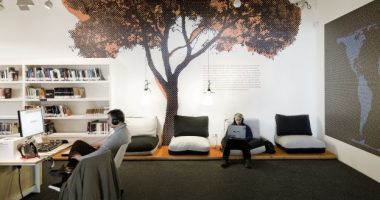GLAM (Galleries, Libraries, Archives and Museums) stands for a project that seeks a union: the one between the producers of cultural centers with the most accessed collaborative content encyclopedia over the Internet. The community, formed by volunteers worldwide who have written more than 15 million articles in 250 languages, shares a purpose with museums, libraries and archives: to disseminate knowledge between users. Under this common front, the initiative seeks to create links between GLAM and cultural sector “to build a proactive relationship with benefits for both parties and without the principles that prevail in each community.” This was explained by Liam Wyatt vicepresident of Wikimedia Australia and first Wikipedian-in-Residence in a museum – the renowned British Museum – at a meeting this July, at the Picasso Museum. The Barcelona meeting, sponsored by the project coordinator at Picasso, Concha Rodà, was an interesting introduction to the work that cultural centers can carry out with Wikipedia and a first contact between cultural managers and representatives of the Catalan Wikipedia.
How can museums and Wikipedia collaborate?
Liam Wyatt’s experience at the British Museum involved spending a month working with the staff, museum curators and the public in order to understand and consolidate the ties between the museum and Wikipedia and to try to improve the quality of the Encyclopedia entries on the British Museum. Wyatt said that not only it is important for an institution to complete and entry on the institution in itself but that there is a lot of content (outstanding work, authors, artists, publications, historical references) which specializes in the cultural sector that can act as a contribution. In Wyatt’s blog one can find examples of this collaboration and the result of his stay at the British Museum. Concha Rodà also proposes some actions in cooperattion at the Picasso blog, that are noted here:
- To facilitate contact with the museum when a user has questions about a topic about content at the center or collection related.
- To facilitate a list of the most significant pieces at the museum to include them in the relevant articles.
- To quickly note the local contact user when there are words or characters with whom we have decided to link to Wikipedia: this will mean they will be able to review or expand their content.
- To establish clear goals for improvement, temporary thematic projects.
- To monitor through the museum the encyclopedia content and alert the areas where we should improve it.
- To establish awards (as the British Museum did) for the best articles about pieces at our museum.
- To participate in the discussion pages of each item before making some corrections, identifying ourselves and making the proposal before deleting content or making any links to our website: doing this without any notice makes it liable of immediate removal.
- Using Wikipedia as a field of work for the museum’s educational activities: encouraging students to write entries which are then subject to review.
Breaking prejudices and clarifying concepts
The collaboration between cultural institutions and wikipedians is still, however, unresolved. One goal of the Catalan Wikipedia community users, is just “to get out of the Internet” and do research directly at institutions. And to do this is it is necessary to break some existing beliefs about the Wikipedia’s most popular network that make it difficult to approach GLAM-Wikipedia.
- Wikipedia is not synonymous with charity Liam Wyatt said that the fact that Wikipedia is a project done by altruistic users with free content under a Creative Commons license does not mean that it is a charitable project. In this sense, it is important that cultural institutions consider wikipedians as equal interlocutors that are generating content and are providing a public service for the user. with the same purpose as a museum.
- Is Wikipedia a reliable source? Some people are shocked that an encyclopedia made by Internet users may have the same reliability as a textbook or an encyclopedia written by experts. Wyatt insisted that Wikipedoa does not compete with traditional sources of information, not wikipedians create original material, but compile information (always referenced!) on a particular topic. Neutrality, verifiability and the obligation of not creating unpublished work are three rules that every editor on Wikipedia have to fulfill. More on the Wikipedia criteria here.
- Everyone at Wikipedia knows what they are talking about? Anyone can write a new entry in Wikipedia, tweak it, improve it or remove an entry that is not correct. There are no editorial privileges and anyone can do these actions, as long as one is aware that one is not alone in Wikipedia. Thousands of eyes are observing and analyzing changes to make sure it meets the editorial criteria and approve or disapprove the new content provided. The B-side of the encyclopaedia is the area of discussion of an entry, that generates real academic debate about whether or not to approve new content.
- Wikipedia is about importance, not advertising During the meeting, one of the topics that became relevant to the debate was about all those entries that wikipedians refuse because they consider it advertising. Does it constitute advertising when a public institution enters information about one of their activities, if it has no profit purpose and only provides information? The response of wikipedians present was unanimous: if an entry is well referenced (has been mentioned in other books or encyclopedias) and is of significant importance to the public, it is not considered advertising.
To break the stereotypes about Wikipedia, Alex Hinojo of Viquipèdia.cat, suggests the article “Allò que Viquipèdia no es“.
All those attending the meeting at the Picasso Museum agreed on the need to hold another meeting at the Picasso Museum in the fall of 2010, which will be extended to other members of the cultural centers and institutions in Catalunya to continue expanding the GLAM-Wiki culture.



Teresa Roig | 27 July 2010
Interessantíssim!!!! moltes gràcies pel post!!!!
Héctor Navarro | 29 July 2010
Genial. Tiene pinta de un verdadero trabajo colaborativo.
admin | 02 August 2010
Gràcies a vososaltres per seguir-nos.
Leave a comment